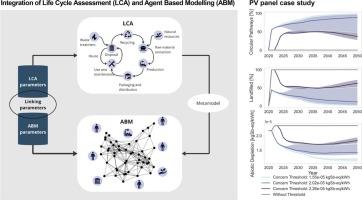元模型驱动的生命周期评估和基于代理的建模集成框架
IF 9.6
1区 环境科学与生态学
Q1 ENVIRONMENTAL STUDIES
引用次数: 0
摘要
能源转型带来了复杂的环境和社会变化,需要强有力的科学政策指导。用于评估这些变化影响的传统生命周期评估(LCA)方法往往无法捕捉能源系统、人类行为和环境影响之间的动态相互作用,从而可能导致误导性或过于简化的结论。本研究引入了一个新的框架,利用基于主体的建模(ABM)将社会变化整合到LCA中。我们的方法利用LCA元模型,通过定义的链接参数与ABM集成,实现代理决策和环境结果之间的实时反馈,同时最大限度地减少计算需求。我们在光伏案例研究中说明了这一框架的应用,研究了生命终结选择如何影响非生物耗竭和气候变化。ABM-LCA集成采用了具有高预测性能的元模型,非生物衰竭和气候变化的R2值分别为0.95和0.82。链接参数基于进入不同寿命终止路径的光伏组件的数量。正如ABM模型中所描述的那样,社会变革是由这样一种假设驱动的,即提高对环境影响的认识会促进循环行为。光伏案例研究提供了一个说明性的探索,说明消费者的选择如何影响环境影响,如非生物耗竭和气候变化,以及这些影响如何反过来塑造未来的消费者行为。这项工作强调了在复杂系统中使用元模型驱动的集成ABM-LCA建模框架进行决策的价值,揭示了意想不到的系统行为,并提供了对可持续过渡的见解。本文章由计算机程序翻译,如有差异,请以英文原文为准。

Framework for metamodel-driven integration of life cycle assessment and agent-based modeling
The energy transition brings about complex environmental and societal changes that require robust science-based policy guidance. Conventional Life Cycle Assessment (LCA) methods to evaluate the implications of these changes often fail to capture the dynamic interactions among energy systems, human behavior, and environmental impacts, leading to potentially misleading or oversimplified conclusions. This study introduces a new framework for integrating societal change into LCA using Agent-Based Modeling (ABM). Our approach leverages LCA metamodels, integrated with the ABM via defined linking parameters, to enable real-time feedback between agent decisions and environmental outcomes, while minimizing computational demands. We illustrate the applications of this framework in a photovoltaic case study, examining how end-of-life choices affect abiotic depletion and climate change. The ABM-LCA integration employs metamodels with high predictive performance, achieving R2 values of 0.95 for abiotic depletion and 0.82 for climate change. Linking parameters are based on the number of PV modules entering different end-of-life pathways. Societal change, as modeled in the ABM, is driven by the assumption that increased awareness of environmental impacts promotes circular behaviors. The photovoltaic case study provides an illustrative exploration of how consumer choices may affect environmental impacts, such as abiotic depletion and climate change, and how these impacts, in turn, may shape future consumer behavior. This work highlights the value of using a metamodel-driven, integrated ABM-LCA modeling framework for decision-making in complex systems, uncovering unexpected system behaviors and offering insights into sustainable transitions.
求助全文
通过发布文献求助,成功后即可免费获取论文全文。
去求助
来源期刊

Sustainable Production and Consumption
Environmental Science-Environmental Engineering
CiteScore
17.40
自引率
7.40%
发文量
389
审稿时长
13 days
期刊介绍:
Sustainable production and consumption refers to the production and utilization of goods and services in a way that benefits society, is economically viable, and has minimal environmental impact throughout its entire lifespan. Our journal is dedicated to publishing top-notch interdisciplinary research and practical studies in this emerging field. We take a distinctive approach by examining the interplay between technology, consumption patterns, and policy to identify sustainable solutions for both production and consumption systems.
 求助内容:
求助内容: 应助结果提醒方式:
应助结果提醒方式:


